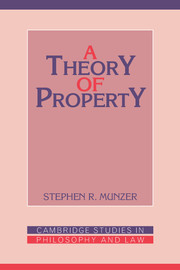Book contents
- Frontmatter
- Contents
- Preface and acknowledgments
- 1 Property, justification, and evaluation
- Part I Property rights and personal rights
- Part II From individuals to social context
- Part III Justification and distributive equity
- Part IV Applications
- 12 Business corporations
- 13 Gratuitous transfers
- 14 A moral and political theory of takings
- 15 Takings and the constitution
- Table of cases
- Index of names
- Index of subjects
13 - Gratuitous transfers
Published online by Cambridge University Press: 05 June 2012
- Frontmatter
- Contents
- Preface and acknowledgments
- 1 Property, justification, and evaluation
- Part I Property rights and personal rights
- Part II From individuals to social context
- Part III Justification and distributive equity
- Part IV Applications
- 12 Business corporations
- 13 Gratuitous transfers
- 14 A moral and political theory of takings
- 15 Takings and the constitution
- Table of cases
- Index of names
- Index of subjects
Summary
TAXATION AND REDISTRIBUTION
This chapter applies the basic theory of property to the justifiability and taxation of gratuitous transfers. A transfer is gratuitous if the recipient obtains nothing through any performance of legal duty by the transferor. Thus, gratuitous transfers differ from sales and other bilateral contractual exchanges and from transfers made to repay a debt or satisfy a court judgment. It does not follow that all gratuitous transfers are unmerited. If a woman takes care of her dying aunt for six months, a bequest of, say, $10,000 may be appropriate even though it is not legally required. In general, such transfers are gratuitous from a legal, but not necessarily a moral or personal, point of view.
Gratuitous transfers fall into two groups: transfers from a living person and transfers from the estate of a person who has died. The former group (inter vivos transfers) consists mainly of gifts. The latter group (transfers at death) divides. If the deceased person made a valid will, the transfers are called devises in the case of real property and bequests in the case of personal property. If that person has no valid will, the transfers occur by intestate succession. In all cases of the latter group, the things received may be called inheritances. For simplicity's sake, the term “bequests” will be used for all transfers by will.
- Type
- Chapter
- Information
- A Theory of Property , pp. 380 - 418Publisher: Cambridge University PressPrint publication year: 1990
- 1
- Cited by

